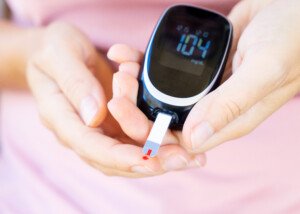
Sudden spikes in blood sugar overnight are something that diabetics don’t want to ever experience.
Something like this happening – blood sugar soaring while you’re sound asleep and totally unaware – is a frightening thought.
But people who do not have diabetes don’t have to worry about very high rises in blood sugar during sleep.
“Actually, sugar can spike in anyone, but in people with normal sugar metabolism, no one notices,” says Susan L. Besser, MD, with Mercy Medical Center, Baltimore, and Diplomate American Board of Obesity Medicine and board certified by the American Board of Family Medicine.
“The cause is normal fluctuation in body glucose (sugar) and metabolism,” continues Dr. Besser.
“Even though we are asleep at night, the body is still working, still using energy.
“At night we aren’t eating while we sleep (at least most of us aren’t), so the body has to use stored sugar [glycogen] to ‘feed’ itself.
These stores “are found in the liver and are released through a hormonal process. In most of us this is used immediately so the sugar doesn’t spike.”
In someone with diabetes, glycogen is converted to blood sugar (glucose), and this happens with everyone — but with diabetics the body cannot use this glucose, so the sugar rises.
Type 2 Diabetes Sugar Spike Overnight
• Like in everyone, the pancreas in most type 2 diabetics produces a normal amount of insulin, a hormone whose job it is to transport glucose molecules from the blood to muscle cells.
• The muscle cells need glucose for fuel. Stored sugar in a muscle cell is called glycogen.
• In type 2 diabetes, the insulin is there, but the transport system is impaired. The insulin receptor sites on muscles cells are not receiving, and/or there’s not enough of them.
• The sugar, unable to gain entry to muscle cells, stays in the blood, where it builds up. A spike can result, including during sleep.
• If the diabetic discovers this via a glucose reading, a bout of exercise will correct the problem.
Type 1 Diabetes Sugar Spike Overnight
• In type 1 diabetes, the pancreas does not produce insulin.
• The insulin receptor sites may be in perfect condition, and there may be plenty of them, too, but glucose will never make it to these sites if there’s no insulin to shuttle over the glucose.
• Type 1 diabetics, then, must take insulin injections.
• If they’re careless with managing this autoimmune disease, an overnight surge in blood sugar can result due to insufficient insulin.









































